You are viewing the Cultures of Knowledge Blog archive for the ‘Project Updates’ Category:
James Brown
May 16, 2011
Events, Lectures, Project Updates
Tags: Databases, Editions, Eighteenth Century, Gottfried Wilhelm Leibniz, History of Philosophy, Mathematics, Networks, Seventeenth Century
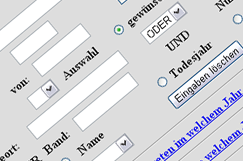
Visit Leibniz correspondence database.
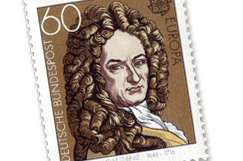
Leibniz depicted on a 1980 stamp.
In the second paper of our seminar series on Thursday 12 May, Dr Nora Gädeke (Gottfried Wilhelm Leibniz Bibliothek) provided us with a privileged insight into ‘Work in Progress: Leibniz’s Correspondence Network’, currently being reconstructed by the Akademie-Ausgabe edition, a group of collaborators in Potsdam, Münster, Hannover, and Berlin, under the aegis of the Academies of Science of Göttingen and Berlin-Brandenburg. In a detailed and reflexive analysis, Gädeke outlined the epistolary activities and contacts of this prolific correspondent, whose surviving letters number c.15,000-20,000, and who saw letter-writing as ‘one of the main characteristics of his life’. She also described the editorial principles and strategies of the definitive, multi-volume Akademie-Ausgabe edition, which include reproducing all items of Leibniz’s corpus chronologically and topically (including all extant copies), as well as the creation of a full critical apparatus. Further, she discussed the practical and conceptual challenges posed by such an ambitious, ‘cinematic’ enterprise. Gädeke concluded her talk, and introduced the question and answer session, by demonstrating the public database of Leibniz’s correspondence, one of a series of innovative online tools developed by the project to facilitate editorial work on the hard-copy volumes and disseminate some key findings beyond the edition itself. Discussion focused on a range of topics, including: the role of patronage in Leibniz’s network; information as a form of ‘social capital’ in early modern Europe; the importance of superimposing places in which letters were sent or received with geopolitical subtleties; Leibniz’s approach to storing and ordering his letters; his motivations for keeping them in the first place; and the key role online databases can play in supporting and publicizing conventional scholarly work on major corpora. Seminars take place in the Faculty of History on George Street on Thursdays at 3pm. For future talks in the series, please see the seminar webpage.
 Podcast now available on the seminar page!
Podcast now available on the seminar page!
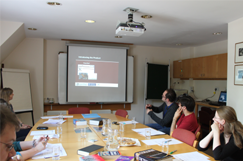
Introducing the product.
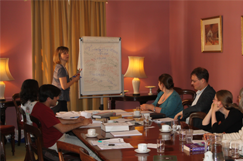
Creating the shortlist.
With the autumn launch of the Project’s union catalogue of early modern letters getting ever closer, and issues of design and functionality now sorted, we are turning our attention to broader questions of digital identity, digital presence, and branding. Heeding UCL digital humanities expert Melissa Terras’s insight that online resources ‘should be taking [their] digital identity and digital presence a lot more seriously’, and aware that ‘naming your brand is the most challenging, momentous, and necessary phase in the process of branding’, we hand-picked a crack team of scholars, librarians, editors, and linguists external to the Project to help us formulate an appropriate appellation for our new resource. Over an intensive ‘logo lunch’ at Linacre College, Dr Kim McLean-Fiander guided our set of sobriquet suggesters through a series of mind-bending puzzles and tasks designed to release creative juices, unlock associative thinking, and lead participants to that elusive ideal name. While the results of the exercise will remain under wraps for now, the input we received was invaluable, and we would like to thank all of the participants for giving us their time.
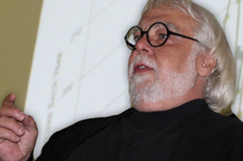
Professor Hatch during his talk.
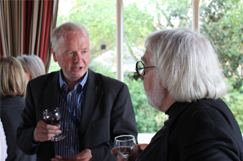
Discussions continue over wine.
In the opening paper of our second seminar series on Thursday 5 May, Professor Robert A. Hatch (University of Florida) got us off to a rousing start with a paper entitled ‘De-Centring the Big Picture: The Scientific Revolution and the Republic of Letters’. In a wide-ranging and suggestive analysis, Hatch argued that correspondence networks were the foremost facilitators of the new science in the early modern period (and vice versa), and for the creation and of vibrant intellectual communities around emergent fields such as astronomy. Compared to printed texts, suggested Hatch, letters were immediate and inclusive, situated the discussion of intellectual themes within the minutia of daily life, and were the primary medium for the gestation and discussion as well as the ultimate dissemination of scientific ideas in this period. The importance of scribal publication as an end in itself throughout the seventeenth century was further emphasized during discussion. Hatch illustrated his talk with a dazzling series of maps and graphs generated from his impressive personal database of scientific correspondences (which includes metadata on the letters of Peiresc, Gassendi, Bouilliau, and many other luminaries), although the necessity of combining quantitative exercises with qualitiative assessments of the formation of epistolary archives was underlined during a lively question and answer session. Seminars take place in the Faculty of History on George Street on Thursdays at 3pm. For future talks in the series, please see the seminar webpage.
James Brown
April 18, 2011
Events, Lectures, Project Updates
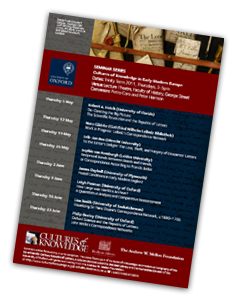 Please join us for the second Cultures of Knowledge seminar series, which will once again take place in Trinity Term 2011 on Thursdays at 3–5pm in the Lecture Theatre of the History Faculty. Entitled ‘Cultures of Knowledge in Early Modern Europe’, and convened by Pietro Corsi and Peter Harrison, the seminar features another impressive programme of eight leading international authorities on seventeenth-century correspondents and correspondence networks. Papers and discussion will be followed by a wine reception. For the full programme and further details, please see the seminar webpage. The seminar poster (pdf) can be downloaded on the right.
Please join us for the second Cultures of Knowledge seminar series, which will once again take place in Trinity Term 2011 on Thursdays at 3–5pm in the Lecture Theatre of the History Faculty. Entitled ‘Cultures of Knowledge in Early Modern Europe’, and convened by Pietro Corsi and Peter Harrison, the seminar features another impressive programme of eight leading international authorities on seventeenth-century correspondents and correspondence networks. Papers and discussion will be followed by a wine reception. For the full programme and further details, please see the seminar webpage. The seminar poster (pdf) can be downloaded on the right.
James Brown
March 21, 2011
Conferences and Workshops, Events, Project Updates, Projects and Centres
Tags: CKCC, Digitization, Geography, Mapping the Republic of Letters, Networks, Spatial Theory, Union Catalogue, Visualization
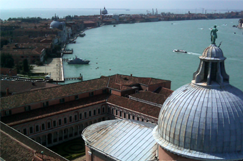
The Fondazione Giorgio Cini on San Giorgio Maggiore, with the island of Guidecca visible in the distance.
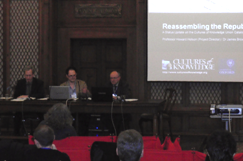
Our panel at the conference, shared with Charles van den Heuvel from CKCC (Huygens Institute).
Last week provided us with an opportunity to present the Project, specifically its union catalogue and associated editorial tools, at the international conference Mapping the Republic of Letters (Venice, 17–18 March 2011). Convened by the Stanford-based project of the same name (based at the Stanford Humanities Center), and held in and co-organised by the Fondazione Giorgio Cini on the island of San Giorgio Maggiore, the event showcased the work being undertaken by various individuals and projects worldwide to collate and represent digitally and spatially the early modern republic of letters. It also explored the research question of whether global exchanges of correspondences and other texts might be best conceived of as a state or as a network. While main sessions provided insights into the very wide range of approaches to this topic, associated meetings introduced the activities of the Milan-based research laboratory Density Design, and facilitated collaborative discussions amongst CofK, our hosts Mapping the Republic of Letters (Stanford), and CKCC (Huygens Institute), who also presented at the event. For further details, please see the conference webpage.
We will be presenting the Project at a wide range of correspondence-related events in 2011. For full details of our speaking schedule, please see the presentations page.
James Brown
February 21, 2011
Project Updates, Publications, Websites and Databases
Tags: Bodleian Resources, Europe, France, History of Medicine, Martin Lister, Montpellier, Networks, Seventeenth Century
 In 1663, Martin Lister left his parents’ house in Burwell, Lincolnshire to study medicine in Montpellier. Whilst in France, he kept a journal in an almanac entitled Every Man’s Companion: Or, An useful Pocket-Book (MS Lister 19, Bodleian Library).
In 1663, Martin Lister left his parents’ house in Burwell, Lincolnshire to study medicine in Montpellier. Whilst in France, he kept a journal in an almanac entitled Every Man’s Companion: Or, An useful Pocket-Book (MS Lister 19, Bodleian Library).
Month by month, Lister noted the medical texts he consulted (and the French romances and comedies he read) in this thin octavo, and annotated the recipes given to him when he lodged with an apothecary. He described the personalities and works of luminaries he met in France including William Croone, Nicolas Steno, and John Ray. Lister performed a series of dissections with Steno, as well as going on natural history expeditions with Ray. Lister also attended the salon of Sir Thomas Crew to discuss ornithology, medicine, and literature, mixing with other fellows of Cambridge and English expatriates. As his time in Montpellier was part of his education as a gentleman, Lister made detailed notes about his visits to gardens and libraries in Paris, manufacturing methods, viniculture, literature and drama, and rules of politesse and art connoisseurship.
Dr Anna Marie Roos, our Lister Research Fellow, has recently been awarded a British Academy Small Research Grant to create a textual edition of the pocketbook with appropriate apparatus. To annotate the edition, she will also utilize 25 pages of memoirs of Lister’s time in Montpellier and 43 pieces of Lister’s French correspondence in the Bodleian Library and in France. As the account of Lister’s journey is so detailed, his grand tour and memoirs will also be recreated as an interactive website using maps, images, and texts, providing a virtual introduction to an early modern medical education.
Podcast now available on the seminar page!










 In 1663,
In 1663, 
 Join
Join 